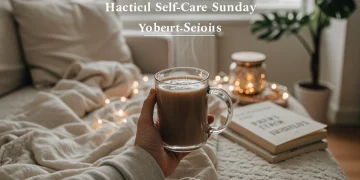Transform Your Sunday: A Personalized Self-Care Ritual Guide

Advertisements
Transform Your Sunday: A Step-by-Step Guide to Creating a Personalized Self-Care Ritual offers a comprehensive approach to designing a rejuvenating self-care routine, promoting relaxation, mindfulness, and personal growth, setting a positive tone for the week ahead and enhancing overall well-being.
Feeling overwhelmed by the week ahead? Reclaim your Sundays with a personalized self-care ritual. This guide, Transform Your Sunday: A Step-by-Step Guide to Creating a Personalized Self-Care Ritual, will help you craft a routine that nourishes your mind, body, and soul, setting you up for a successful and stress-free week.
Advertisements
Embrace the Power of Self-Care Sundays
Sunday, often seen as the bridge between relaxation and the imminent work week, can easily become a source of anxiety. But what if you could transform your Sunday into a sanctuary of self-care, a day dedicated to recharging and preparing for the challenges ahead? Self-Care Sundays are about intentionally carving out time for activities that nourish your well-being, reduce stress, and boost your overall mood.
By creating a personalized self-care ritual, you’re not just pampering yourself; you’re investing in your mental and physical health. This intentional act of self-compassion can significantly impact your ability to handle stress, improve your relationships, and increase your productivity throughout the week. Let’s explore how you can design a Sunday self-care routine that perfectly fits your needs and preferences.
Why Prioritize Self-Care on Sundays?
Sundays offer a unique opportunity to disconnect from the demands of work and other obligations. It’s a time to slow down, reflect, and engage in activities that bring you joy and relaxation. Prioritizing self-care on Sundays can help you:
- Reduce stress and anxiety by engaging in calming activities.
- Improve your mood and boost your overall sense of well-being.
- Increase your energy levels and prepare you for the week ahead.
- Strengthen your connection with yourself and your needs.
Whether you’re a busy professional, a stay-at-home parent, or a student, incorporating self-care into your Sunday routine can make a significant difference in your overall quality of life. The key is to find activities that resonate with you and create a routine that feels sustainable and enjoyable.
Taking the time to engage in self-care activities on Sundays can greatly improve your emotional state and readiness for the week. It is an investment in your overall health, and contributes to a healthier state of mind!
Step 1: Reflect and Identify Your Needs
Before diving into specific activities, it’s crucial to take some time to reflect on your current needs and priorities. What areas of your life feel depleted? What activities bring you the most joy and relaxation? What are your goals for your self-care Sunday?
Answering these questions will help you create a self-care routine that is tailored to your unique circumstances and preferences. This isn’t about copying someone else’s routine; it’s about designing a day that truly nourishes you.
Journaling for Self-Reflection
Journaling can be a powerful tool for self-reflection. Take some time on Saturday evening or Sunday morning to write about your feelings, thoughts, and any challenges you’re currently facing. Consider these prompts:
- What am I grateful for in my life right now?
- What are my biggest stressors this week?
- What activities make me feel the most relaxed and energized?
- What are my goals for my self-care Sunday?

The simple act of putting your thoughts and feelings on paper can provide clarity and help you identify areas where you need to focus your self-care efforts. It’s a way to check in with yourself and gain a deeper understanding of your inner landscape.
Understanding the “why” behind choosing particular self-care activities personalizes and strengthens the process, making it relevant to the current moment.
Step 2: Curate a List of Self-Care Activities
Now that you have a better understanding of your needs and priorities, it’s time to brainstorm a list of self-care activities that appeal to you. The possibilities are endless, and the key is to choose activities that you genuinely enjoy and find relaxing.
Don’t feel pressured to include activities that are trendy or popular if they don’t resonate with you. This is your self-care Sunday, and it should be filled with activities that make you feel good. Here are some ideas to get you started:
Mindfulness and Relaxation
- Meditation: Even a few minutes of daily meditation can produce tangible benefits.
- Deep breathing exercises: Focus on your breath to calm your mind and reduce anxiety.
- Yoga or stretching: Improve flexibility, reduce muscle tension, and promote relaxation.
- Taking a warm bath with essential oils: Create a spa-like experience in your own home.
Creative Expression
- Painting, drawing, or coloring: Unleash your creativity and express yourself through art.
- Writing poetry or short stories: Explore your imagination and emotions through words.
- Playing a musical instrument: Immerse yourself in the joy of making music.
- Gardening: Connect with nature and nurture living things.
A good method is to keep a running list to reflect all possible activities that are interesting.
Step 3: Design Your Personalized Sunday Routine
With your list of self-care activities in hand, it’s time to create a personalized Sunday routine. Consider your schedule, energy levels, and any other commitments you may have.
Remember, this routine should be flexible and adaptable to your needs. Don’t feel pressured to follow it perfectly every week. The goal is to create a framework that supports your well-being, not another source of stress. Aim for including elements of relaxation, physical activity, and creative activities to balance your Sunday routines.
Sample Sunday Self-Care Schedule
- 8:00 AM: Wake up naturally without an alarm.
- 8:30 AM: Enjoy a healthy breakfast and a cup of tea.
- 9:00 AM: Practice meditation or deep breathing exercises for 15 minutes.
- 9:30 AM: Go for a walk in nature or do some light stretching.
- Choosing the proper physical activity can influence the rest of your day greatly.
- 10:30 AM: Dedicate time for a creative activity like drawing or writing.
- 12:00 PM: Prepare a nourishing lunch.
- 1:00 PM: Read a book or watch a comforting movie.

Creating a routine can be beneficial, but remember to be open to other types of activities or something you really like!
Step 4: Create a Relaxing Environment
Your surroundings can significantly impact your ability to relax and unwind. Take some time to create a peaceful and inviting environment in your home.
This could involve decluttering, lighting candles, playing soothing music, or adding plants to your space. The goal is to create a sanctuary where you feel comfortable and safe.
Tips for Creating a Calming Atmosphere
- Declutter your space: A clean and organized environment can reduce stress and promote relaxation.
- Use soft lighting: Dim the lights and use candles or lamps to create a warm and inviting atmosphere.
- Play soothing music: Choose calming music or nature sounds to help you relax.
- Add plants to your space: Plants can purify the air and bring a sense of nature indoors.
Many people ignore their surroundings as a factor they can change, but it may be influencing you more than you think!
Step 5: Disconnect from Technology
In today’s digital age, it’s easy to get caught up in the constant stream of notifications, emails, and social media updates. But disconnecting from technology is essential for true self-care and relaxation.
Consider setting aside specific times during your self-care Sunday to unplug from your devices. This could involve turning off your phone, closing your laptop, and avoiding social media. Use this time to be present with yourself and engage in activities that nourish your mind and body.
Strategies for a Digital Detox
- Set specific times to disconnect: Designate certain hours or activities as tech-free zones.
- Turn off notifications: Silence your phone and disable notifications to avoid distractions.
- Avoid social media: Resist the urge to scroll through social media feeds.
- Engage in offline activities: Focus on activities that don’t involve technology, such as reading, writing, or spending time in nature.
Removing screen time from your day may seem difficult, but it makes a huge difference once you get into it.
Step 6: Practice Self-Compassion
Self-care is not just about engaging in relaxing activities; it’s also about practicing self-compassion. This means treating yourself with the same kindness, understanding, and acceptance that you would offer to a friend.
Be mindful of your inner critic and challenge negative self-talk. Remind yourself that you are worthy of love, respect, and care. Embrace your imperfections and acknowledge your strengths. Remember, self-care is an act of self-love, not selfishness.
Cultivating Self-Compassion
- Challenge negative self-talk: Replace critical thoughts with positive affirmations.
- Practice forgiveness: Forgive yourself for any mistakes or shortcomings.
- Treat yourself with kindness: Be gentle and understanding with yourself.
- Acknowledge your strengths: Celebrate your accomplishments and talents.
Being aware of these positive elements can greatly impact your well-being.
| Key Element | Brief Description |
|---|---|
| 🧘♀️ Relax and Meditate | Practice mindfulness to reduce stress and promote peace. |
| 🎨 Creative Activities | Engage in hobbies like art or writing to spark creativity. |
| 🌿 Nature Connection | Spend time outdoors to rejuvenate your mind and body. |
| 📚 Unplug to Recharge | Disconnect from technology for mental clarity and rest. |
Frequently Asked Questions
▼
Self-care is crucial because it helps manage stress, improves mood, and boosts overall health. Taking time for yourself recharges your mental and physical batteries, leading to a more balanced and fulfilling life.
▼
Reflect on what activities make you feel relaxed, happy, and energized. Consider your stressors and what helps you alleviate them. Experiment with different activities until you find what truly resonates with you.
▼
Start small by scheduling short breaks throughout the day. Use these moments for quick meditations, stretching, or mindful breathing. Even a 10-minute walk or reading a chapter of a book can make a difference.
▼
Disconnecting from technology reduces stress and mental fatigue caused by constant notifications and digital stimulation. This allows you to be more present, focused, and receptive to relaxation and self-reflection.
▼
Yes, self-care rituals can significantly improve your productivity. By reducing stress and enhancing your mood, you increase your focus, creativity, and ability to handle challenges effectively, leading to a more productive week.
Conclusion
Transforming your Sunday into a personalized self-care ritual is an investment in your overall well-being. By following these steps, you can create a routine that nourishes your mind, body, and soul, setting you up for a successful and fulfilling week ahead. Remember, self-care is not a luxury; it’s a necessity for living a balanced and joyful life.





